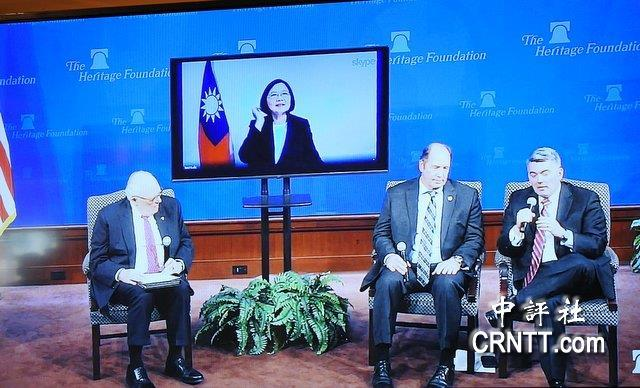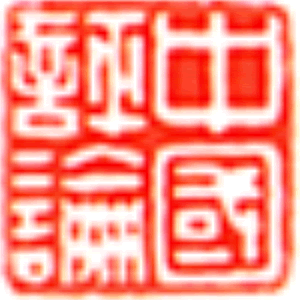
|
| 蔡英文在夏威夷与华府智库传统基金会进行视讯会议。(中评社 黄筱筠摄) |
以下为“总统府”提供蔡英文的谈话内容:
PART 2:QA Session Moderated by Dr. Ed Feulner
第1题:两岸关系
我对两岸关系的立场一向明确,即“我方”须秉持务实态度、维持现状及持续做负责任的利害关系者。然而这并不容易。
北京持续坚持其想要的“九二共识”、“一个中国”及最终的“一国两制台湾方案”。北京从未思考过台湾人民所期待的,即维持现有的生活方式及保留在不受胁迫之情况下做决定的权利。
我们必须坐下来,在不设前提的情况下,坦诚讨论双方的共同点。双方必须先展现善意,才能创造更多两岸间的长久互信。“我方”坚守此信念,我想我们在全球的朋友与伙伴亦支持这样的想法。
My position on cross-strait relations continues to be clear:we need to be pragmatic, we need to maintain the status quo, and we need to continue being a responsible stakeholder. They have not made this easy.
Beijing has continued to focus on what they want:the “1992 consensus,” “one China,” and, eventually, a “one country, two systems model for Taiwan.” They have not thought about what the people of Taiwan want, which is to be able to maintain our way of life and ability to make our own decisions, free of coercion.
We need to be able to sit-down and have frank discussions about how we can find common ground without preconditions. Both sides must be willing, as a first step, to show goodwill so that we are able to create more lasting trust across the Taiwan Strait. I remain committed to this, and I think our friends and partners around the world remain supportive of this process as well.
第2题:我与太平洋岛国关系
中国确实持续强化在太平洋地区之行动,包括对我们的“友邦”。其目的是争取这些国家在经济上、政治上及某种程度在战略上,与中国更紧密。
美国、澳大利亚、日本及其他利害关系者已逐渐瞭解这个情况,许多理念相近国家也看到了中国的行为对区域在债务、稳定及良善治理方面所构成的挑战。
这就是为什么台湾有必要与理念相近国家合作,在太平洋地区创造以价值为基础的伙伴关系。
我相信当太平洋国家有权利选择时,它们会偏好与具共享价值与利益的国家合作,获得援助及投资。
因此,我们会持续强化与美国在私人投资领域的合作,包括透过“海外私人投资公司”(OPIC)。
我们会确保在基础建设、教育、医疗卫生及农业等领域的援助符合当地人民的实际需求,并寻求机会邀请其他理念相近国家也扮演若干角色。
我们会更加广泛地分享相关成果,不仅是和当地政府,也包括一般民众;同时加强反制中国的讯息,分享中国言而无信的真实案例。
我们相信我们的价值体现在与太平洋各国的关系上,我们也希望和理念相近国家合作,建立广泛的伙伴关系,以维护这些价值。
It’s true that China continues to increase their actions in the Pacific, including in our diplomatic allies. Their purpose is to bring these countries closer to them economically, politically, and to a certain extent, strategically.
There has been an increased awareness of this issue by the US, Australia, Japan, and other stakeholders. Many like-minded countries see the challenge that China’s actions pose in terms of debt, stability, and good governance – issues that are extremely important in the Pacific.
This is why I think it’s essential for Taiwan and like-minded countries to work together to create a values-based partnership in the Pacific.
I believe that when given a choice, Pacific states would prefer that assistance and investment come from countries that share their values and interests.
As a result, we will enhance our cooperation with the US in areas of private investment, including through the Overseas Private Investment Corporation (OPIC).
We will ensure that our current assistance into infrastructure, education, healthcare, and agriculture corresponds closely with the actual needs of their people, and find ways to invite other like-minded countries to play a role.
We will more broadly share the good narrative we’ve been building, not only with their governments, but also everyday people. And on the flip side, cooperate with partners to counter the Chinese narrative, and share examples of areas where the Chinese have not lived up to their promises in the region.
We believe our values underpin each and every one of our relationships in the Pacific. And we want to actively work with like-minded countries to build a broad partnership to ensure that these values are protected.
第3题:安全
捍卫我们2,300万人民、民主制度及生活方式系第一要务,尤其强化国防力量以具备抵抗侵略的能力为最关键核心。
本年已系国防预算连续增长的第三年,为近年首例。这些资金将被用在真正具影响力的国防计划上,包括不对称作战能力、人员训练及确保“我国”顺利转换至全募兵制。
“我国”正积极建构必要的能力,惟迄未能采购潜舰及教练机。爰“我国”防工业在衰退多年后,今已再度复苏。
我们十分感谢美国持续售我装备,这些装备均系经审慎评估,且符合台湾实际需求。“我方”已申购M1坦克及F-16V战机,当大幅强化“我国”的陆、空防卫能力,提升军队士气,并向世界展现美国防卫台湾的承诺。
此外,“我国”刻投注大量资源进行人员训练及防卫战略革新,让不对称作战能力尽快到位,以更有效因应“我方”所面临的威胁。
整体而言,我盼藉由前述各项作为,确保台湾人民选择自己的未来,不受威吓。
My number one priority is to ensure that our 23 million people, democracy, and way of life are well protected. Strengthening our armed forces so that we have the capacity to deter aggression is a core part of that.
This year we are seeing the third consecutive year of defense budget increases for the first time in recent history. These funds have been directed into programs that will make a real difference in Taiwan’s defense, including asymmetrical capabilities, training, and ensuring that the transition to the all-volunteer force proceeds smoothly.
We are building for ourselves capabilities that we need, but have not been able to procure, such as submarines and trainer jets. After long years of decline, our defense industries are coming back to life.
We are grateful that the United States has continued to sell us equipment that, after careful review, are based on Taiwan’s actual needs. We are pleased to have submitted new requests for M1 tanks and F-16V fighter jets, which will greatly enhance our land and air capabilities, strengthen military morale, and show to the world the US commitment to Taiwan’s defense.
We are also investing heavily into training as well as the modernizing our defense strategies to prioritize the use of asymmetrical capabilities, so that they more closely correspond with the realities of the threat we face.
Altogether, I hope that these actions will ensure that the people of Taiwan remain able to choose our own futures, free of coercion.
第4题:台美经贸关系
一直以来,台湾是美国重要的经济伙伴,台湾目前是美国第十一大贸易伙伴。就在去年,我们见证了许多台湾公司在美扩大投资石化及制铝产业。我们也宣布有关天然气及黄豆等新的采购案。
台湾正在做的已超乎所有人的预期。
问题在于,我们如何再进一步推进台美经贸关系?
如果我们能更全面地检视台湾的战略环境,就会发现台美真有需要在贸易层面深入交往。大体而言,台美应讨论包含在科技剽窃及5G产业掌控的忧虑下,台湾在全球高科技产业供应链的角色。同时也应包含,在中国透过经济行为者增加在台湾政治影响力的同时,台湾如何从战略思考的角度,减少对中国贸易的依赖。
因此,我们仍将优先推动双方讨论台美双边贸易协定。此协定对台美均有利,且回应特朗普政府在亚洲经济交往的诉求。它也同时符合战略所需,拉近台湾高科技供应链与美国的距离,并将台湾贸易分散至与我共享相同利益及价值的伙伴。
如果台湾能在对美贸易上有所突破,将有助鼓励其他贸易伙伴跟进。
Taiwan has consistently been a great economic partner of the US. We are your 11th largest trading partner. Just over the past year, we have seen a number of Taiwanese companies expand their investments in the petrochemical and aluminum sectors. We have announced new purchases of natural gas and soy beans.
Taiwan is punching above our weight.
The question is where do we go from here?
If we look at Taiwan’s strategic situation more holistically, there is a very real need for us to engage further on trade. Broadly, this includes discussions on Taiwan’s role in the global high-tech supply chain amid concerns of technology theft and control over 5G networks. It includes strategic considerations on how we can reduce our trade reliance on China as they increase their political influence in Taiwan, primarily using economic actors. It includes many questions that require us to sit down and have serious conversations about.
Therefore, our priority remains to enter discussions for a bilateral trade agreement with the US. This will be mutually beneficial and reflective of the Trump administration’s economic engagement in Asia. It also makes sense strategically, bringing Taiwan’s high-tech supply chain closer to the US, and diversifying our trade to partners that share our interests and values.
And if we can have a breakthrough in trade with the US, this would be very helpful in terms of encouraging many other trading partners to do the same. |
